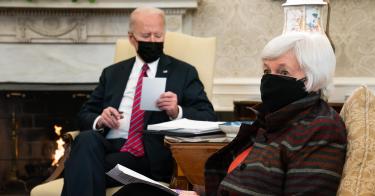Less than one week after a group of climate scientists warned that “climate models were never developed to provide finessed information for financial risk,” Treasury Secretary Janet Yellen announced that she is creating a new senior position at the department for a “Climate Czar.”
There is no official word yet on whether the Environmental Protection Agency will name a “Financial Czar,” but don’t be surprised if it happens. The U.S. has been moving away from a system of limited government for many years, and that trend is now obvious across the federal apparatus.
In the case of Treasury, there was always something of a battle over exactly what role the agency should play, but it is doubtful that either Alexander Hamilton or Albert Gallatin (Jefferson’s Treasury Secretary) believed that the federal government should regulate and monitor all of the financial risks that Americans take, especially not to the degree that it does now. The Federalists and Democratic-Republicans disagreed over many policy details, but they both wanted the U.S Treasury Department’s main function to be overseeing the federal government’s revenue, expenditures, and (perhaps most importantly) public credit.
>>> Janet Yellen Should Focus On Fiscal Policy, Not Environmental Activism
While Treasury’s responsibilities should include little else, its role has grown well beyond an agency that ensures the soundness of the nation’s public credit. According to Treasury’s website:
The U.S. Department of the Treasury's mission is to maintain a strong economy and create economic and job opportunities by promoting the conditions that enable economic growth and stability at home and abroad, strengthen national security by combating threats and protecting the integrity of the financial system, and manage the U.S. Government’s finances and resources effectively.
It would be great for Americans if Treasury just focused on managing the government’s finances and resources effectively, instead of trying to do a little bit of everything, but the U.S. has not taken such an approach for decades.
Particularly after the 1930s, the federal government took on the role of monitoring and regulating financial decisions to ensure that people did not take on too much risk. Aside from the expansive efforts undertaken by Treasury, Congress created a slew of new government institutions in the beginning of the 20th century, such as the Federal Reserve, the Department of Labor, the Department of Commerce, the Securities and Exchange Commission, and the Federal Deposit Insurance Corporation.
And even though federal deposit insurance surely helped to quell retail bank runs during the depression era, it is difficult to argue that this new approach has actually worked better than allowing private investors to do their own risk monitoring and managing. There is no doubt that federal risk regulation has contributed to financial crises, especially the one that occurred in 2008.
The U.S. is one of only three developed countries with at least two banking crises between 1970 and 2010. Yet, throughout history, Congress has followed virtually every crisis period with the same response: more invasive federal regulation. (It is complete nonsense that any sort of deregulation effort took place in financial markets before the 2008 crisis).
Much like those who cling to the idea that “true socialism” has never really been tried, advocates of more invasive federal regulation have consistently doubled down on their failed approach.
After the 2008 crisis, the new spin was that previous regulations had failed because they were too narrowly focused on individual risk-taking rather than systemic risk. This excuse, as many others, was drastically overblown. It is undeniable that regulators had focused on systemic risks prior to the 2008 crisis.
>>> The Myth of Financial Market Deregulation
All the post-2008 efforts (including the 2010 Dodd-Frank Act) really accomplished was to deliver even more vague and ill-defined mandates to U.S. financial regulators. Without any statutory definitions to limit them, regulators have spent the last decade broadening their own definitions of “systemic risk” and “financial stability” to (as Chicago’s John Cochrane notes) “monitor risks” everywhere in the financial system. With something like “financial stability” as the goal, the rules essentially aim to prevent someone from losing money, a feature that would be disastrous in financial markets even if the concept was defined narrowly.
This approach is even more troubling because of the way regulations work in practice. All federal regulators create rules in consultation with members of the industry, not in a vacuum. The more voluminous and the more broadly defined the regulations, the more of a license the companies have to make up numbers that satisfy the regulators.
This approach becomes a self-perpetuating system that makes it very easy to double-down after a crisis period, keeps the largest and best-connected members of the industry afloat, and erects more barriers to entry that keep more productive competitors at bay. The typical American is not a beneficiary.
The new push to incorporate climate risk into financial regulations will only magnify these problems. Worse, there is no chance that any of these new regulations will help stop the earth’s climate from changing, as it has done for several billion years.
If Congress wants to “phase out financing” of the fossil-fuel industry, they should stand up and do it through the legislative process to remain accountable to voters. Giving unelected bureaucrats in federal agencies such authority abdicates Congress’s responsibility, runs counter to the system of checks and balances the American founders created, is incompatible with dynamic private markets, and is likely to be used against climate change activists in the future. Other than that, a climate czar at Treasury seems like a great idea.
This piece originally appeared in Forbes https://www.forbes.com/sites/norbertmichel/2021/02/17/janet-yellen-should-focus-on-fiscal-policy-not-environmental-activism-part-2/?sh=6596b226103c



